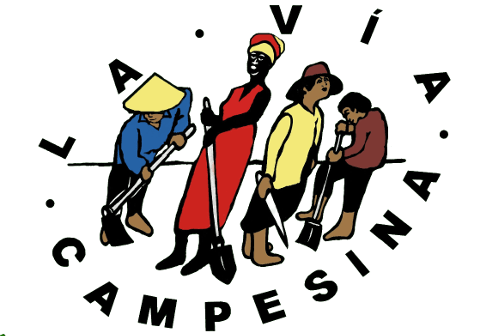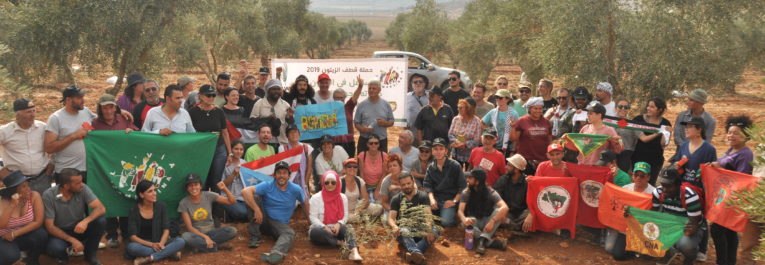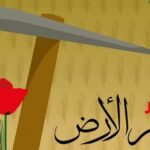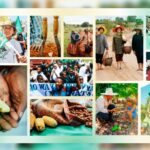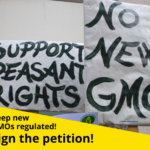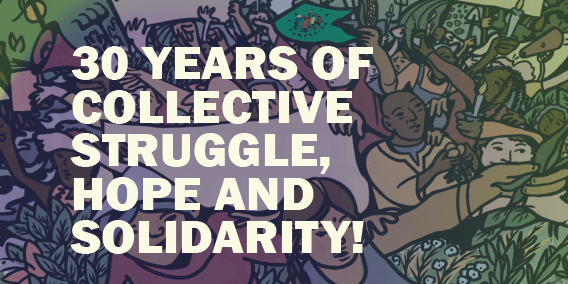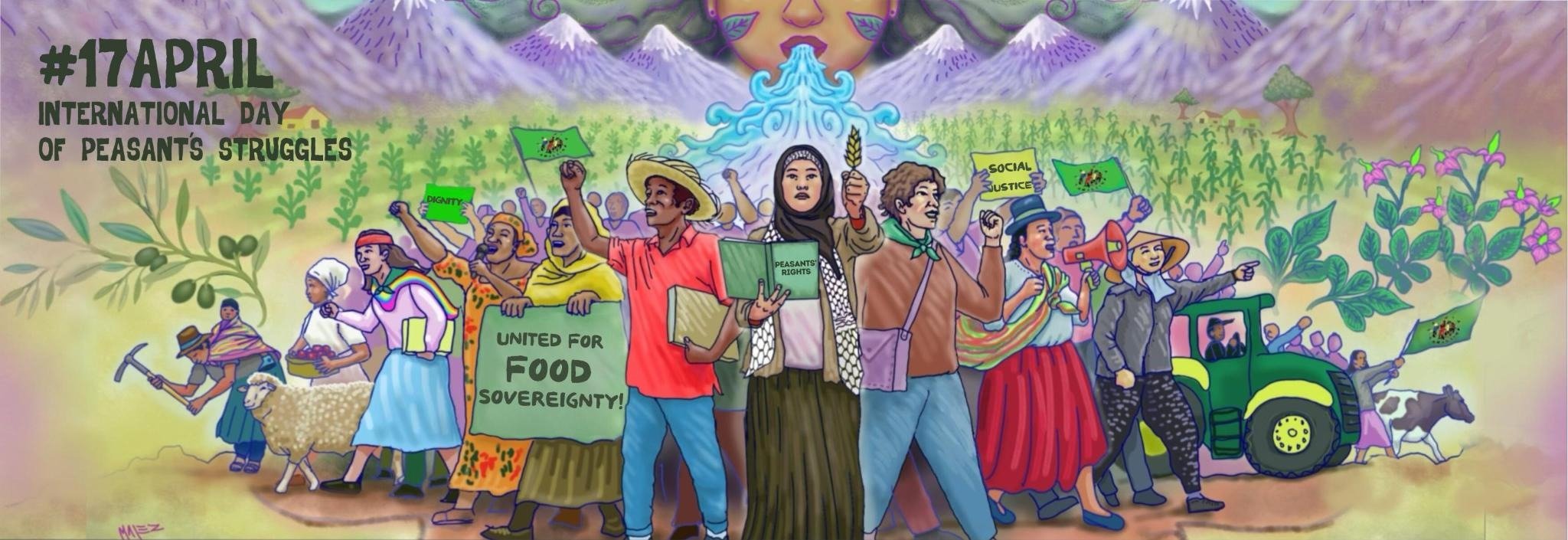Following the conference “Food Sovereignty: Colonies and Frontiers”, a delegation of 18 Via Campesina members and allies from Honduras, Brazil, Puerto Rico, Dominican Republic, South Africa, Colombia, the Basque Country, Mozambique, Germany and the United States, participated in a series of visits in different locations across the occupied Palestinian territories. The visits were organised by the Union of Agricultural Work Committees (UAWC), the Palestinian member of La Via Campesina who had also co-organised the food sovereignty conference in Ramallah on 14 – 15 October. Among the delegation’s highlights were participation in the olive harvest with local farmers, a seeds exchange ceremony, a visit to UAWC’s local seed bank and to the Kalandia and Dheisheh refugee camps.
Politics of occupation
It is difficult to grasp what is at stake in the occupied Palestinian West Bank without a basic understanding of the Kafkaesque means of its control that are imposed by the Israeli occupation.
The West Bank is divided into three areas: A, B, and C. These categories were part of the Oslo Accords that were intended to set the framework for a future Palestinian state. Area A includes built-up Palestinian urban areas. This area is the most autonomous of the three categories, as it is under the military and civilian control of the Palestinian Authority. But despite this semblance of normalcy, Israeli military incursions are still commonplace. La Via Campesina’s international delegation witnessed this contradiction first-hand at the Dheisheh refugee camp in Bethlehem. Despite being under full Palestinian control, the Israeli military conducts frequent raids and arrests inside this camp, where approximately 3,500 Palestinian refugees live cramped in less than 1.5 square kilometres. “[Israeli] Soldiers come and go as they wish, which spells doom for us. In March 2019, a 17-year-old boy was killed. He was a folkloric dancer of the camp’s dance group,” stated Hamsa, one of the refugees. Hamsa is a member of Ibdaa, a cultural centre inside the camp where La Via Campesina members were hosted for three days.
Area B is slightly more exposed to the occupation; while Palestinians maintain civilian control, it falls under the jurisdiction of the Israeli military. But it is in Area C where the Palestinians of the West Bank feel the occupation at its rawest and deepest because that area is under full civilian and military control of Israel. At the Kalandia refugee camp, one of the few urban zones in area C, La Via Campesina’s delegation witnessed some of the methods through which oppression is exerted against Palestinian citizens.
The refugee camp is infamously known for its military checkpoint. For the 2.8 million citizens living in the West Bank, the Kalandia checkpoint represents the main crossing point to enter East Jerusalem and Israel. Each day, almost 30 thousand Palestinians cross it for work, visiting family in nearby villages cut off by the “wall of apartheid”, or to obtain medical treatment. While only a few kilometres apart, their journey may take hours. There are often long lines of vehicles and pedestrians that stretch on for hours, as those who pass through undergo extensive security screenings and document checks. The checkpoint can be closed by the Israeli military at any given time with little or no explanation – a reminder that Palestinian’s freedom of movement is entirely subject to arbitrary decisions made by the occupying forces, in complete disregard for the needs of Palestinians.
Making up more than 60 per cent of the West Bank, Area C is an overwhelmingly rural area and the richest in natural resources. This area was only meant to be controlled by Israel for an interim period of 5 years, set to expire in 1998 with a move towards statehood. Today, more than 20 years later, the occupation of Area C and related human rights violations are illegal according to international law.
On the ground, this means that Israeli settlements and military grounds are able to proliferate in nearly unchecked ways — strategically grabbing land and water from Palestinian hands and undermining Indigenous sovereignty over their commons. The less the land is worked, the more vulnerable it is to being swept up by the occupation. In addition to the other restrictions imposed on Area C, Israeli authorities adhere to an ancient Ottoman law that claims if the land is not used for three years it can be converted into state land. For this reason and despite many obstacles, Palestinian peasant communities of farmers and herders work their land continuously.
Palestinian peasants and international linkages
UAWC has been a key driver of land reclamation through agroecology, working with some 20,000 Palestinian peasants across the West Bank and Gaza each year. Its organisational principles are rooted in internationalism and solidarity — making its incorporation into La Via Campesina a natural fit. And at the same time, the Palestinian struggle is a capsule of the big picture of things that La Via Campesina is fighting against colonialism, imperialism, and racialized capitalism.
Although La Via Campesina has only had official Palestinian representation through UAWC since 2013, the movement’s involvement in Palestine goes much farther back. An international delegation of civil society organisations including La Via Campesina camped out at Yasser Arafat’s compound in Ramallah when it was under siege in 2002 – surrounding the space in a circle of locked hands. A decade later, in 2012, allies in West Asia and North Africa created the Arab Food Sovereignty Network that has been active in critical spaces such as the UN Committee on World Food Security.
But true to form, La Via Campesina’s representatives are most comfortable doing what they have always done best — and that’s agricultural activism. Among other activities, this year’s delegation participated in the annual olive harvest, under the guidance of UAWC.
Together with figs, olive trees are Palestine’s most important and beloved crop: they can live and bear fruit for thousands of years, a symbol of Palestinian steadfastness on the land over generations. The presence of La Via Campesina’s delegation during the harvest carried both solidarity and political significance. Each year, during the olive harvesting season, when many Palestinian peasants and their families are at work, violence by Israeli settlers and military increases. Besides threatening and attacking peasants, each year, settlers forcibly remove, cut or burn olive trees. Between 800,000 and a million olive trees have been uprooted or cut down since 1967. For three days, the international delegation provided company and support to different olive farming communities located in Area C, adopting the human shield tactic to help reduce the vulnerability of the peasants to such attacks.
Seeds of hope
On 16 October, the International Day of Action for People’s Food Sovereignty and Against Transnational Corporations, the Via Campesina delegation visited a peasant’s cooperative in the Hebron district, where a seeds exchange ceremony took place. Following the Palestinian tradition, some of the seeds to be sown during the next season were offered by the local peasants to members of the delegation who, in turn, shared a message of solidarity and hope with their hosts. “We, from La Via Campesina, want to express our deep respect to you and your struggle for freedom,” said one peasant leader from Colombia. “Whenever we have seeds, we have life. And life is a symbol of hope for all humanity,” he added.
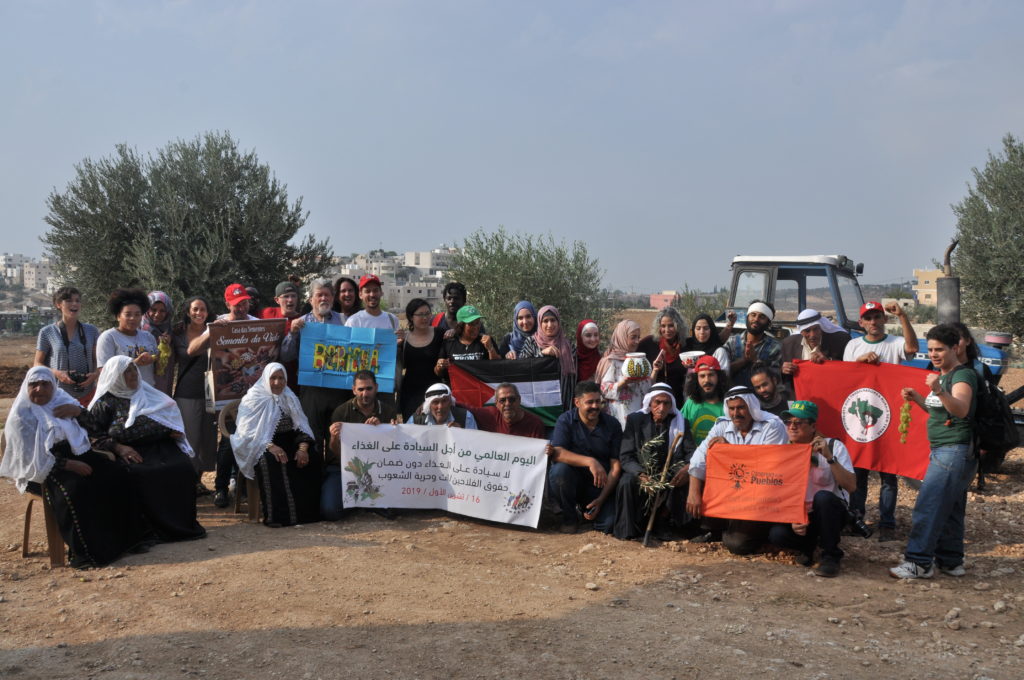
Next, the delegation visited UAWC’s local seed bank, one of its most significant contributions in helping Palestinians achieve food sovereignty. Established in Hebron in 2003, the bank is the first and only of its kind in Palestine. The bank saves, protects, preserves, stores and reproduces 45 varieties of local vegetable and field crop seeds from 12 plant families, many of which risked extinction. Among them are corn, barley, wheat, cauliflower, turnip, cowpeas, eggplant, squash, okra, bitter gourd and snake cucumber seeds. All of these seeds come directly from Palestinian farmers and undergo a two-year verification process before being stored and made available to other farmers.
The bank is equipped with four units: an entry unit, a test laboratory, a drying unit and a storage unit where seeds are stored for a maximum of five years. To protect this enormous genetic heritage from catastrophic events, samples of these seeds are also stored for the long term at sub-zero temperatures. After documenting the seeds’ performance in the field, such as germination percentage, seedling growth and flowering, UAWC provides these seeds for free to Palestinian peasants for at least two seasons annually.
This contributes to increasing farmers’ revenues. In addition, these seeds help farmers fight against the effects of water grabbing by the Israeli occupation, as well as global warming since they are drought-resistant and require no irrigation. As opposed to the hybrid seed varieties sold by Israeli and multinational companies like Bayer-Monsanto, the local seeds are fertilised with animal manure and require no chemical pesticides or glyphosate-based weed killers.
“We used to have to buy seeds from Israeli companies at high costs,” said Mahmoud Abu K., a longtime farmer and member of UAWC. “But today, because of UAWC’s seed bank, many of us are able to plant with between 90 and 95 per cent local seeds,” he said with pride.
The local seed bank works with key farmers like Mahmoud Abu K. through a three-step process. Once the farmers receive the seeds, plant them and harvest, they divide the newly produced seeds into three groups. The first group is intended for their needs in the current season. The second group has to be stored and planted again in the upcoming season. And the third group is returned to the local bank in order to benefit other farmers and keep building seed sovereignty in Palestine.
“When farmers have their own seeds and can reproduce them, it means they can choose what to plant and when to plant,” explained Do’a Zayed, UAWC’s seed bank coordinator. “And that’s why we established this local seed bank.” She then summarized: “Seed sovereignty is the first step to achieving food sovereignty”. These intertwined political projects are part of the struggle for freedom and justice — in Palestine, and around the world.
